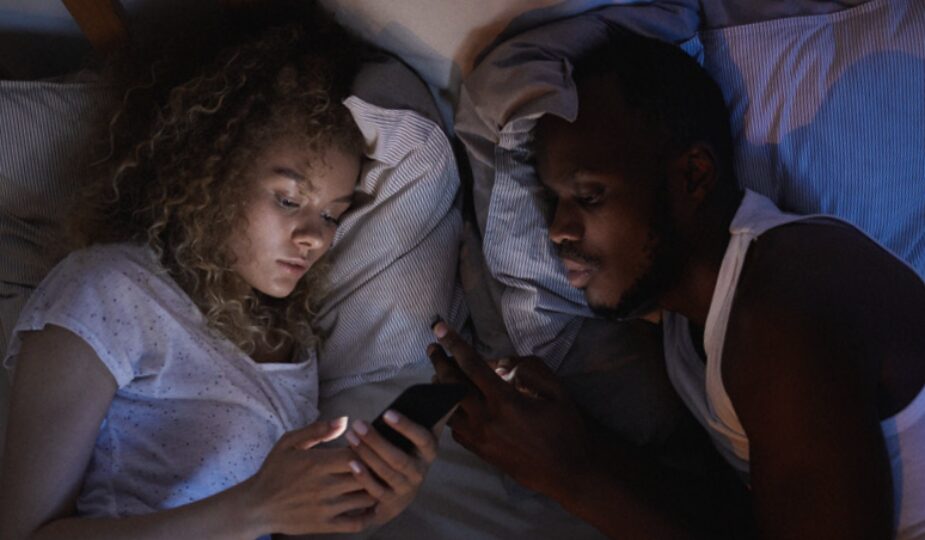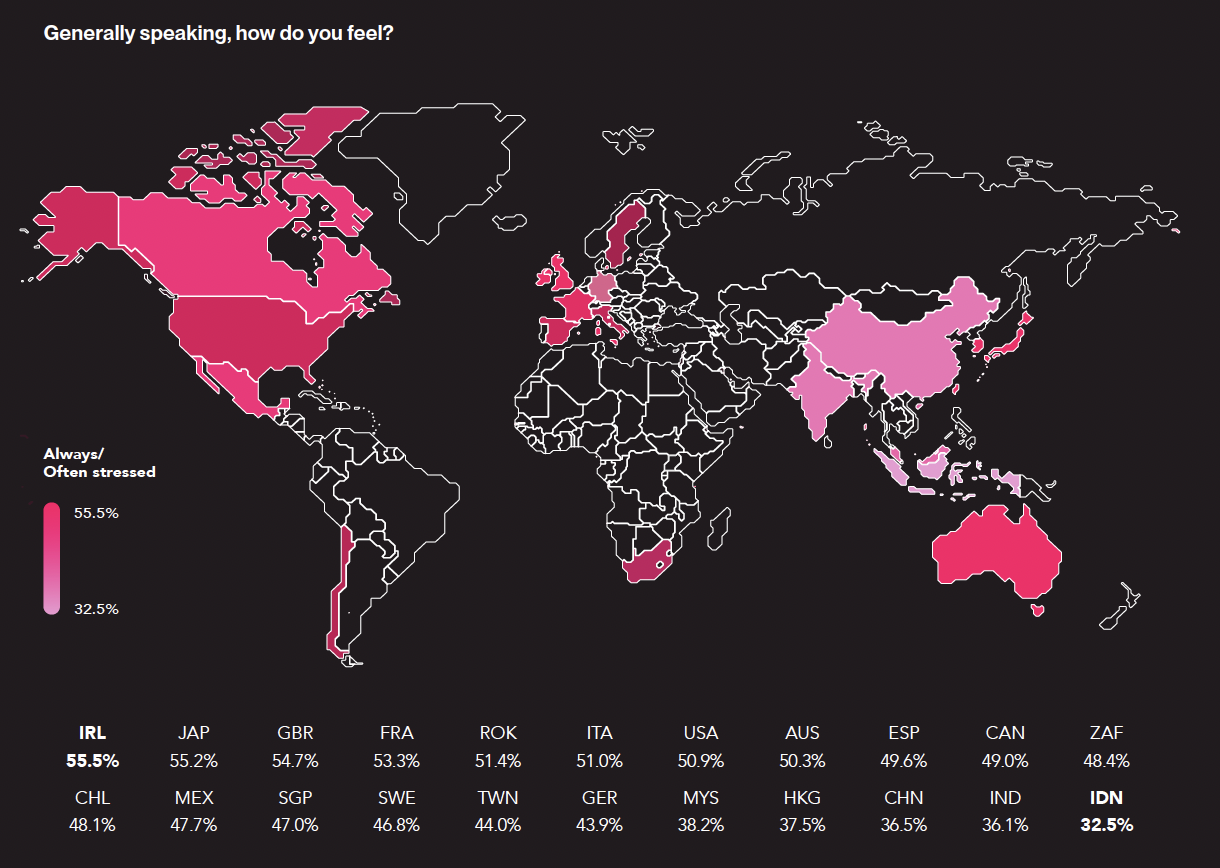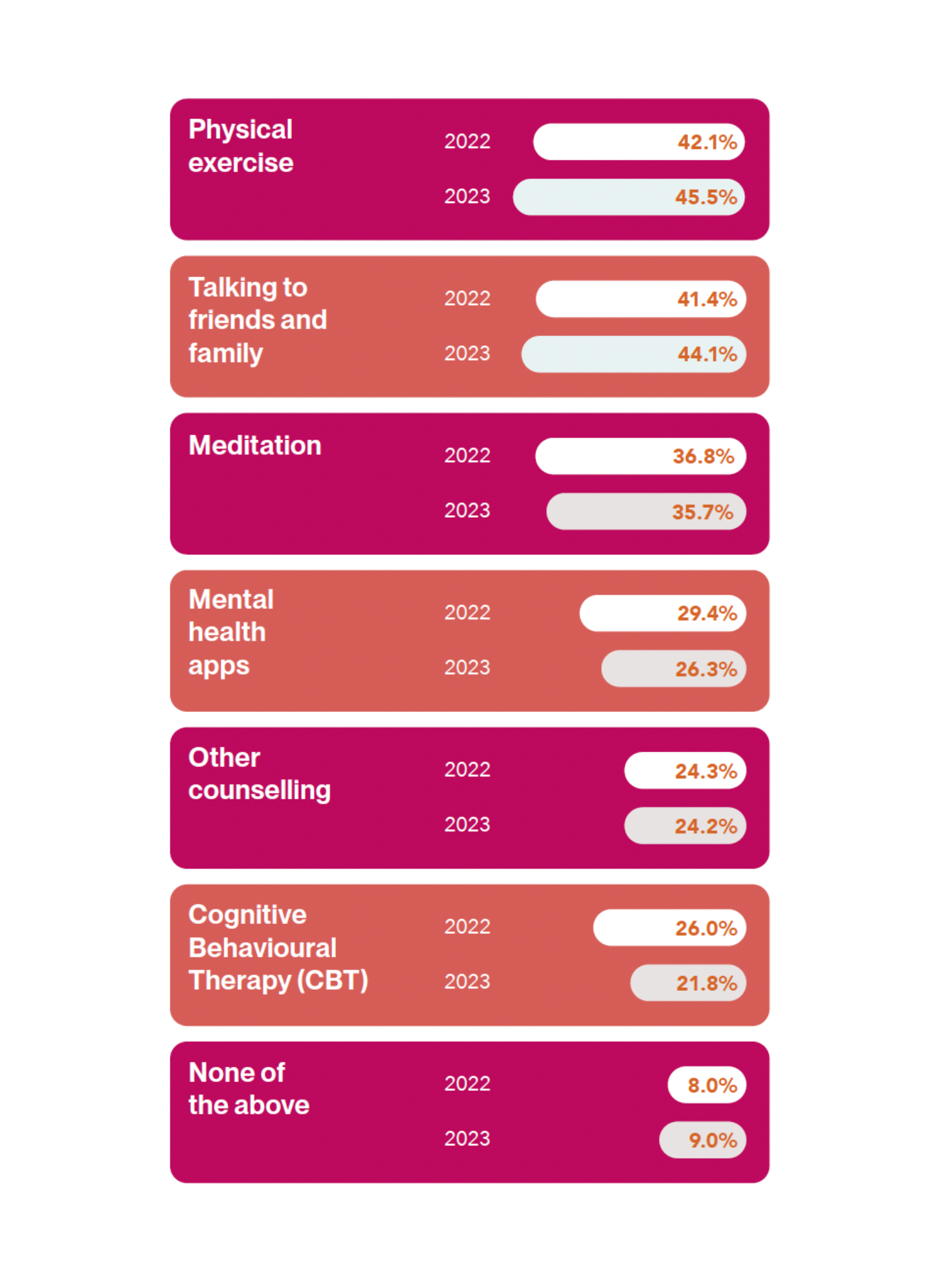Stress, mental health and social media usage in young insurance consumers

Recent years have seen discussions around mental health become increasingly open. Progress in this space is largely being driven by younger generations – the target group in our 2023-24 Global Consumer Study (GCS) – who appear determined to eradicate taboos around emotional strife.
-
86.3% of young people check social media at least once every 2 hours.
Regardless of generation though, there is consistency on the top cause of stress for young people – financial issues. Over a quarter of all respondents who say they are "often" or "always" stressed list financial issues as the top cause of this stress (26.2%), followed by work issues (20.4%) and uncertain futures (18.4%).
Curiously, global issues such as climate change and war caused the least anxiety for young people, with only 6.4% of stressed respondents saying this was their primary concern. This is particularly surprising, given the documented evidence of eco-anxiety in young people.[5] However, even though there is a groundswell of emotional consternation among young people about global instabilities, it appears that other, more personal issues, may be causing a greater deal of stress.

A look at the impact of social media
The "information age" has transformed our communication, shrunk our world and redefined our behaviour. Unlike their parents, Millennials and Gen Zs grew up immersed in social media, with the latter barely remembering a time without it.
But with a slew of studies now reporting the negative impact of social media on stress[9], self-image, and wellbeing – tendencies which have even been documented in leading TV shows such as Netflix’s Black Mirror – is social media a double-edged sword for young people?
The overwhelming majority (86.3%) of our respondents from around the world said they were checking social media at least once every two hours, with more than 1 in 10 checking their apps every 10 minutes (11.9%). Expectedly, Gen Zs used social media slightly more frequently than Millennials, though usage is high across both groups.
Despite their higher usage of social media, Gen Zs have a more negative perception of it than their elder counterparts. 27.2% of Gen Z respondents felt social media negatively impacted their mental health, compared with just 21.4% of Millennials.
-
More than 1 in 10 young people look at their phone every 10 minutes
One of this year’s most noteworthy correlations emerges in relation to social media usage and self-declared stress level. Young people who reported being "always stressed" tend to check social media more frequently than other groups, with over half (55.2%) checking at least every 30 minutes. On the other hand, those who claim to be "neutral" or "mostly calm" were checking less often, with once an hour or once every 2 hours the modal responses in these groups, respectively.
Curiously, outlier data indicates that individuals identifying as "always calm" are also checking social media more frequently than the norm, contradicting the general trend that of higher stress levels correlating with more frequent social media usage. One possible explanation is that while social media increases anxiety for many young people, it may actually bring peace of mind to others.
For many Chinese respondents though, they do not consider their appetite for apps damaging. At 44.9%, China had the highest number of people who did not experience negative effects from social media usage, more than 13% ahead of next-place France. An explanation for this may come from the fact that China bans access to sites such as Instagram, X (formerly Twitter), Facebook and YouTube, in favour of its own channels like Douyin, WeChat and Weibo - China has often been quicker to regulate the addictive aspects of its own apps than Western alternatives have of theirs.[10]
In terms of sector, 63.9% of those working in Publishing were looking at social media at least every 30 minutes, higher than any other area of employment – understandable for an industry amid a well-documented digital transformation.[11] At the other end, Military personnel were the most infrequent checkers, with 17.5% booting up their social apps no more than once a day, perhaps unsurprisingly given the restrictions armies can place on phone usage while on duty.
Solving the issue of stress
So far, we have looked at the levels of stress Millennials and Gen Zs are experiencing around the world, considered the causes they cite for that stress and observed the impact of social media usage on mental health. But what about resolving it? What actions are young people taking to tackle their stress?
For respondents who told us they had experienced a period of stress which prevented them from completing usual activities, we asked how they resolved the strain. Overall, physical activity (45.3%) and talking to friends and family (44.1%) remain the two most popular resolutions, as they were in 2022.
Notably though, the number of Gen Zs saying they find exercise helpful as a way of dealing with stress was 7% lower than that for Millennials. Assessing by region, we see even more stark differences ere: almost three times the number of Indian respondents claimed a benefit in their mental state as a result of physical activity (67.4%) compared to those in Japan (22.6%).
Encouragingly for the providers of health and wellness solutions, more than a quarter of young people found that mental health apps were helpful when dealing with mental angst (26.3%).
Additionally, a lower number of respondents in this year’s survey claimed to find Cognitive Behavioural Therapy (CBT) useful in addressing a mental health crisis (21.8%) when compared with last year’s data from the same generations (26%). If such a trend continues in the future, it may be indicative of CBT falling out of favour as a treatment for mental health concerns, something which has been claimed in recent years.[12]

Key Findings
- Financial issues are on average the biggest cause of stress for young people, with 26.2% ranking this their top cause for concern.
- Social media is checked by the majority of young people (86.3%) at least every 2 hours, with more than 1 in 10 looking every 10 minutes (11.9%). However, almost a quarter of respondents say it negatively affects their mental health.
- Physical activity (45.3%) remains the most popular resolution for young people in dealing with stress, while talking to friends and family (44.1%) also provides significant comfort.
References
[3] Office for National Statistics. (2022). Inflation and cost of living for household groups. [Online]. Available at: https://www.ons.gov.uk/economy... inflationandthecostoflivingforhouseholdgroups/october2022 [Accessed 20 June 2023]
[4] Marketplace / Edison Research. (2018). The Gig Economy. [Online]. Available at: https://www.edisonresearch.com/wp-content/uploads/2019/01/Gig-Economy-2018- Marketplace-Edison-Research-Poll-FINAL.pdf. [Accessed 20 June 2023].
[5] Hickman, C. et al, (2021). Climate anxiety in children and young people and their beliefs about government responses to climate change: a global survey. [Online]. The Lancet Planetary Health (Vol 5, Issue 12). Available at: https://www.sciencedirect.com/... article/pii/S2542519621002783
[6] Centre for Addiction and Mental Health. Mental Illness & Addiction Index. [Online]. Available at: https://www.camh.ca/en/health-... stress [Accessed 20 June 2023].
[7] Mental Disorders fact page (2022). World Health Organization. [Online] Available at: https://www.who.int/news-room/... [Accessed 20 June 2023].
[8] Gaitz, C. (1980). Diagnosing mental illness in the elderly. [Online]. National Library of Medicine. Available at: https://pubmed.ncbi.nlm.nih.go... [Accessed 20 June 2023].
[9] Kuss, D. & Griffiths, M. (2011). Online Social Networking and Addiction—A Review of the Psychological Literature. Int. J. Environ. Res. Public Health. 8(9), pp.3528-3552. [Online]. Available at: https://www.mdpi.com/1660-4601... [Accessed 19 June 2023].
[10] Zeyi, Y. (2023). How China takes extreme measures to keep teens off TikTok. [Online]. MIT Technology Review. Available at: https://www.technologyreview.c... [Accessed 21 June 2023].
[11] McGlone, A. & Fazil, A. (2021). Digital Transformation of the Publishing Industry. [Online]. London Strategic Consulting. Available at: https://www.londonstrategiccon... [Accessed 21 June 2023]
[12] Johnsen, T. J., & Friborg, O. (2015). The Effects of Cognitive Behavioral Therapy as an Anti-Depressive Treatment is Falling: A Meta-Analysis. [Online]. Psychological Bulletin. Available at: http://dx.doi.org/10.1037/bul0...